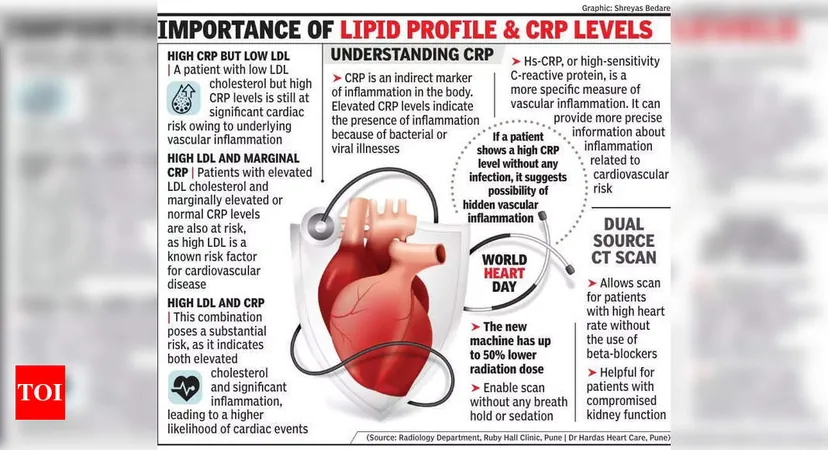
Heart Health: Why Lipid Monitoring Isn't Enough! Discover the Hidden Dangers!
2024-09-29
Author: Nur
In recent discussions among cardiology experts in Pune, a crucial message has emerged: assessing cardiac risk requires more than just a typical lipid profile. While measuring cholesterol levels is a common practice, relying solely on this metric can lead to an incomplete understanding of one’s cardiovascular health. Experts emphasize the necessity to consider additional biomarkers, particularly C-reactive protein (CRP), to gain a comprehensive view of heart health.
Senior cardiologist Dr. Suhas Hardas highlighted the significant role inflammation plays in cardiovascular diseases. Atherosclerosis, characterized by fatty deposit buildup in arteries, is influenced not only by high cholesterol levels but also by inflammatory processes. “While patients may feel reassured if their low-density lipoprotein (LDL) cholesterol, often deemed the 'bad' cholesterol, is normal, this alone cannot guarantee a low cardiac risk,” Dr. Hardas cautioned.
High-sensitivity C-reactive protein levels, known as hs-CRP, are particularly noteworthy. Elevated hs-CRP indicates ongoing inflammation within the arteries, which could destabilize arterial plaques and heighten the risk of heart attacks. Numerous studies have established a strong correlation between increased levels of LDL and CRP, reinforcing the need for a dual approach to cardiovascular assessment. “Implementing both LDL and CRP/hs-CRP testing offers a more accurate health snapshot,” said Dr. Hardas.
However, awareness of CRP/hs-CRP testing remains low among general practitioners and family physicians. Dr. Hardas stressed the importance of enhancing education surrounding these tests, as many patients first consult these healthcare providers about their cardiovascular concerns.
Fortunately, effective treatments exist for managing both cholesterol and inflammation. Statins, such as Rosuvastatin, are commonly prescribed to lower LDL cholesterol levels. Additionally, another critical test to consider is serum homocysteine levels. Dr. Abhay Somani, a senior cardiologist at Ruby Hall, explained that elevated homocysteine (a condition known as hyperhomocysteinemia) can trigger serious medical conditions, including atherosclerosis and even Alzheimer's disease. Common deficiencies in vitamin B6, B12, or folic acid often lead to high homocysteine levels.
Moreover, lipoprotein (a), known as Lp(a), is an independent indicator of premature atherosclerosis, and experts are urging that it be included in routine assessments. Other advanced tests not commonly performed include myeloperoxidase (MPO) and trimethylamine N-oxide (TMAO). “Research indicates that low TMAO levels are often found in individuals following vegetarian diets, suggesting a healthy microbiota balance,” Dr. Somani noted, while highlighting that high levels of TMAO are linked to endothelial dysfunction leading to coronary artery disease. Elevated MPO levels have similarly been associated with increased cardiovascular risk.
In conclusion, a holistic approach taking into account inflammation and various biomarkers is essential for accurately assessing cardiovascular health. Individuals are encouraged to consult with their healthcare providers to discuss comprehensive testing options, ensuring they don’t fall victim to the oversimplification of heart health assessments. Taking control of heart health means being informed and proactive!
Stay tuned for more health insights and updates!




 Brasil (PT)
Brasil (PT)
 Canada (EN)
Canada (EN)
 Chile (ES)
Chile (ES)
 Česko (CS)
Česko (CS)
 대한민국 (KO)
대한민국 (KO)
 España (ES)
España (ES)
 France (FR)
France (FR)
 Hong Kong (EN)
Hong Kong (EN)
 Italia (IT)
Italia (IT)
 日本 (JA)
日本 (JA)
 Magyarország (HU)
Magyarország (HU)
 Norge (NO)
Norge (NO)
 Polska (PL)
Polska (PL)
 Schweiz (DE)
Schweiz (DE)
 Singapore (EN)
Singapore (EN)
 Sverige (SV)
Sverige (SV)
 Suomi (FI)
Suomi (FI)
 Türkiye (TR)
Türkiye (TR)
 الإمارات العربية المتحدة (AR)
الإمارات العربية المتحدة (AR)